|
|
|
Sort Order |
|
|
|
Items / Page
|
|
|
|
|
|
|
| Srl | Item |
| 1 |
ID:
132561
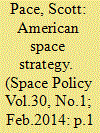

|
|
|
|
|
| Publication |
2014.
|
| Summary/Abstract |
This Viewpoint addresses American space strategy and the choices that lie before US space practitioners. Space activities today play critical roles in U.S. national security, economic growth, and scientific achievements. Satellite communications link the world. The Global Positioning System (GPS) is an integral part of several critical infrastructures, and enables functions ranging from survey and construction, to farming, finance, and air traffic management e not to mention US military forces worldwide. Less well understood is how the GPS time signal provides a global time base for encrypted communications e including point-of-sale transactions with credit or debit cards. Without GPS, much of today's economy would come to a halt. Beyond the Earth, we have rovers on the surface of Mars, and a probe that has left the solar system. The International Space Station represents a unique collaborative
partnership between the United States, Europe, Canada, Japan, and Russia. Spacefaring states are concerned with the long-term sustainability and security of space activities as a result of increasing orbital debris and the proliferation of space capabilities of new national entrants, some of them potential adversaries.
|
|
|
|
|
|
|
|
|
|
|
|
|
|
|
|
| 2 |
ID:
132082
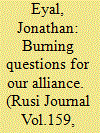

|
|
|
|
|
| Publication |
2014.
|
| Summary/Abstract |
Russia's annexation of Crimea and its actions in eastern Ukraine have led to a fundamental shift in Europe's security environment. Jonathan Eyal argues that NATO will have to find a way to reassure its Eastern European members without repudiating existing structures for co-operation with Russia.
|
|
|
|
|
|
|
|
|
|
|
|
|
|
|
|
| 3 |
ID:
129855
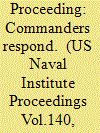

|
|
|
|
|
| Publication |
2014.
|
| Summary/Abstract |
In today's complex and dynamic threat environment, military leaders must effectively employ limited resources to execute their country's national security strategy. Proceedings asked sea service commanders around the world; it is often said that a nation's national defecne decisions are ultimately derived from its own sovereign interests. Given this presumption, what are the global trends that most influence your national security decision making and how does your navy use its operating policies, alliance and partnership to address these trends.
|
|
|
|
|
|
|
|
|
|
|
|
|
|
|
|
| 4 |
ID:
099675
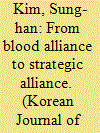

|
|
|
|
|
| Publication |
2010.
|
| Summary/Abstract |
South Korea's strategic thought toward the United States has been evolving from a blood alliance during the Cold War era, to a transitional alliance during the post-Cold War era, and to a strategic alliance after September 11. Despite some trials and errors, South Korea has successfully adjusted itself to new strategic challenges by transforming and reinventing its alliance with the United States. As part of a soft-balancing strategy, this endeavor has been conducted in parallel with South Korea's improved relations with other major powers than the United States and its support for multilateral security cooperation so that the United States may not impose its own strategic preferences on South Korea. In these attempts, we can discover strategic elements that are realist (utilizing the U.S. as a strategic balancer between China and Japan), liberal (going beyond the military alliance), and constructivist (joining the regional community-building).
|
|
|
|
|
|
|
|
|
|
|
|
|
|
|
|
| 5 |
ID:
132021
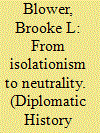

|
|
|
|
|
| Publication |
2014.
|
| Summary/Abstract |
This essay assesses the pitfalls of relying on isolationism to describe American political culture during the 1920s and 1930s and proposes that the concept of neutrality offers a more useful framework for understanding how Americans struggled with their place in a world at war. Americans had long worried about foreign entanglements, but what lent the debates after World War I their special urgency and potency was a sense that one important option in the traditional conduct of international relations-neutrality-had become unhinged from its moorings. Understanding the shifting meanings, and ultimately the perceived demise of neutrality as a viable form of statecraft, points toward a new way to narrate the turning points and political alliances of the interwar years. It also helps to explain why, since the 1930s, Americans have become more readily embroiled in military conflicts overseas despite their recurring doubts about the price of such engagement.
|
|
|
|
|
|
|
|
|
|
|
|
|
|
|
|
| 6 |
ID:
154939
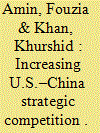

|
|
|
|
|
| Summary/Abstract |
Historically, China had been a great power and had maintained the largest economy
in the world for quite a long time. It would, therefore, like to regain its lost status.
There is consensus among many scholars that China would rise peacefully by
adopting the five “principles of peaceful co-existence”, thus, it would take a leading
role in the 21st century. It is viewed that the United States is already convinced to a
great extent that it might not be able to maintain sole dominance for too long in the
backdrop of the rising Chinese economic and military power. Based on an in-depth
analysis of the issue, the study concludes that China would avoid clashing with
Washington and its allies while protecting its economic interests across the globe.
Nevertheless, the Chinese would react if their core interests are threatened by the
United States and its allies including India. In order to protect its long-term interest
in the region and beyond, China would gradually develop its military including its
maritime capabilities to increase its influence beyond China’s periphery. However;
it is highly unlikely that in the near future, China would contest the United States
and its allies beyond the South China Sea. The study also concludes that in this
great ongoing game between the quadrangles of the countries, if India makes a
principle decision to stand by the United States in the case of a conflict with China
over the Indian Ocean, such a scenario would limit Pakistan’s options to either join
China or stay neutral. Either of the two options would pose a serious challenge for
Pakistan. A decision to stay outside the Great Powers’ power politics would be even
more difficult.
|
|
|
|
|
|
|
|
|
|
|
|
|
|
|
|
| 7 |
ID:
132558
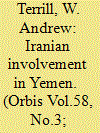

|
|
|
|
|
| Publication |
2014.
|
| Summary/Abstract |
For at least a decade, there have been numerous Yemeni, Saudi, and other countries' assertions that Iran has been involved in supporting northern Yemeni rebels seeking autonomy from the Sana'a government. Iranian diplomatic and political support for this rebellious group (known as the Houthis) is undeniable, but Iranian military assistance for them has not always been easy to prove. This situation appeared to change in 2011 when Iran's increased involvement in Yemen occurred in response to both the chaotic situation there during the final year of the Saleh regime and the danger that the Arab Spring revolutions would leave Iran increasingly isolated. Evidence of Iranian efforts to supply weapons to the Houthis now seems overwhelming in contrast to uncertain reports prior to 2011. In addition, at least some of Yemen's southern secessionists also appear to be receiving at least limited Iranian financial support.
|
|
|
|
|
|
|
|
|
|
|
|
|
|
|
|
| 8 |
ID:
130236
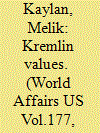

|
|
|
|
|
| Publication |
2014.
|
| Summary/Abstract |
After Forbes magazine named Vladimir Putin the most powerful man in the world, a status he has surely consolidated by overseeing the Winter Olympics and the invasion of Crimea, one heard a great deal of media talk about the Russian leader's wily skills in playing the global geostrategic "game." What one didn't hear, what one virtually never hears, even from highly experienced Western commentators on Russian affairs, is anything about Putin acting according to principles or pursuing actions according to a coherent ideology. Not surprising, you might say, since the man obviously has no such concerns-other than a will to win, for himself and his seat of power; no vision comparable to that of the Kremlin in the old Soviet Union, which furnished it and its allies with a huge asset and a troublesome headache in the form of an armory of fully rationalized ideas that legitimized a predictable approach to international relations and even provided the regime with a perverse "morality."
|
|
|
|
|
|
|
|
|
|
|
|
|
|
|
|
| 9 |
ID:
083351
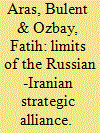

|
|
|
|
|
| Publication |
2008.
|
| Summary/Abstract |
The Russian and Iranian governments define their relations as "very close" and "strategic" in many areas. The frontiers of this cooperation, in geopolitical terms, include the south Caucasus, central Asia, Afghanistan, and the oil- and natural gas-rich Caspian basin, while, at the issue level, the cooperation includes the nuclear issue, disarmament, the struggle against terrorism, the Iraqi quagmire, the Palestinian problem, and the U.S. military expansion into Eurasia. The signs of cooperation in these areas are, among others, regular political dialogue and similar attitudes in refusing to include the Lebanese Hizballah on terrorist lists, pursuing political relations with Hamas, maintaining a pro-Arab position on the Arab-Israeli question, objecting to foreign military engagement in Eurasia, and having a common voice during the Israeli-Lebanese conflict in 2006. However, we need to discover the nature of these relations in order to decide whether the close Russian-Iranian relations can be described as a strategic alliance. What is the strategic depth of Russian-Iranian relations? Do the relations consist merely of the conjectural necessities of the post-Cold War period? What are the "red lines" in Russian-Iranian relations? This article analyzes the relations between these two countries from a broader perspective, to examine the meaning of the relations in bilateral, regional and international contexts
|
|
|
|
|
|
|
|
|
|
|
|
|
|
|
|
| 10 |
ID:
132094
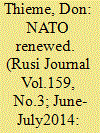

|
|
|
|
|
| Publication |
2014.
|
| Summary/Abstract |
As the NATO summit in Wales approaches, the US debate about the country's international strategy becomes more and more relevant, particularly in the light of recent developments in Eastern Europe and discussions about the role of the Atlantic Alliance post Afghanistan. Don Thieme explores some of the most pressing issues dominating this debate and suggests six reasons why the US needs to remain engaged in a renewed NATO.
|
|
|
|
|
|
|
|
|
|
|
|
|
|
|
|
| 11 |
ID:
073468
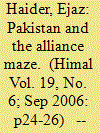

|
|
|
| 12 |
ID:
073817
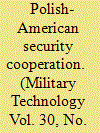

|
|
|
| 13 |
ID:
132708
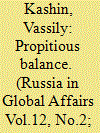

|
|
|
|
|
| Publication |
2014.
|
| Summary/Abstract |
The Ukrainian crisis has demonstrated once again that the global Chinese business empire is growing much faster than Beijing's military-political capabilities. There has again emerged a need for a more active Chinese policy to protect national interests.
|
|
|
|
|
|
|
|
|
|
|
|
|
|
|
|
| 14 |
ID:
125264
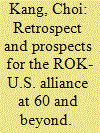

|
|
|
|
|
| Publication |
2013.
|
| Summary/Abstract |
The year 2013 marks the 60th anniversary of the ROK-U.S. alliance. The catchphrase "We go together," which is used in the ROK/U.S. Combined Forces Command (CFC), well captures its founding spirit. Since the beginning of the alliance, with the signing of the ROK-U.S. Mutual Defense Treaty in 1953, it has been a key element in both countries' security strategies. Both have agreed to upgrade the alliance to "strategic alliance." To realize a strategic alliance, clear guidelines that go beyond simple rhetoric must be adopted and an action plan devised through intense discussions. For that purpose, it is essential for South Korea and the United States to undergo a bottom-up review process of the alliance. It is important to pay careful attention to: identification of challenges the two must cope with together (for what); the division of labor (who should do what); plans and strategy (how); and cooperation mechanisms (through what). Along these lines, it is important to think about how to enrich the contents of military cooperation as the backbone of the alliance. To avoid any misunderstanding and over-expectations of the United States, South Korea must make it clear what it can and cannot do on the basis of undiminished mutual respect.
|
|
|
|
|
|
|
|
|
|
|
|
|
|
|
|
| 15 |
ID:
082907
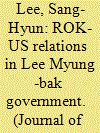

|
|
|
| 16 |
ID:
163949
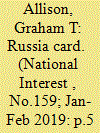

|
|
|
| 17 |
ID:
070334
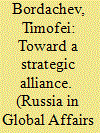

|
|
|
| 18 |
ID:
132079
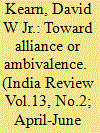

|
|
|
|
|
| Publication |
2014.
|
| Summary/Abstract |
Utilizing prevailing International Relations theory, this article seeks to explain the conditions under which India and the United States can be expected to achieve deep, long-term, strategic cooperation that could culminate in a formal alliance. Specifically, it considers the insights and predictions of realist and liberal theories while also considering critical domestic level factors that may shape India's capacity to be a reliable and attractive partner. While dramatic progress has been made since the initial thawing of the Cold War relationship, this article concludes that the future is likely to be a mixed bag, as the recent Obama experience has reflected. Only the emergence of an overtly revisionist China is likely to drive New Delhi and Washington toward a traditional alliance.
|
|
|
|
|
|
|
|
|
|
|
|
|
|
|
|
| 19 |
ID:
070063
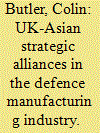

|
|
|
| 20 |
ID:
131188
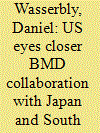

|
|
|
|
|
| Publication |
2014.
|
| Summary/Abstract |
The United States is pushing for closer Ballistic Missile Defence (BMD) cooperation among its allies in Asia as a bulwark against ballistic missile proliferation
|
|
|
|
|
|
|
|
|
|
|
|
|
|
|
|
|
|
|
|
|